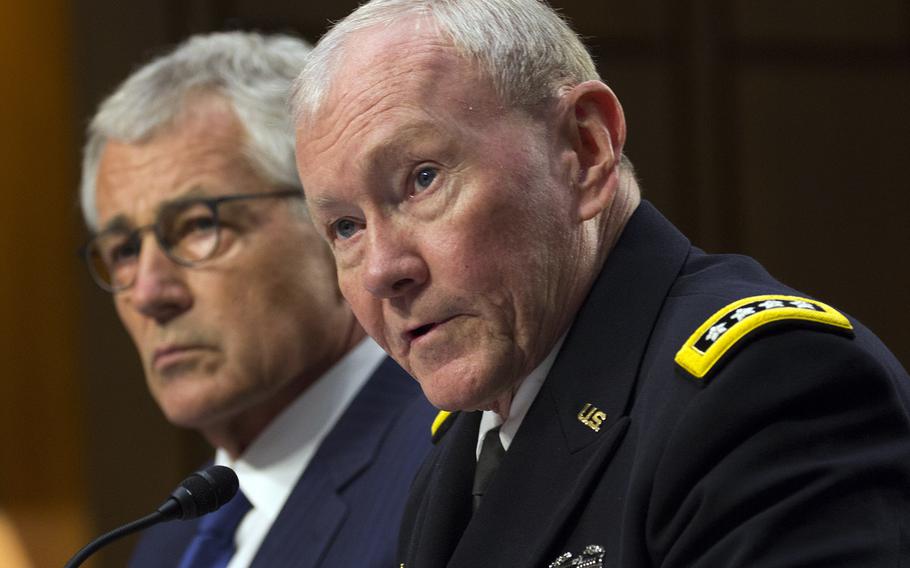
Secretary of Defense Chuck Hagel listens as Joint Chiefs of Staff Chairman Gen. Martin Dempsey testifies before the Senate Armed Services Committee, Sept. 16, 2014. (Joe Gromelski/Stars and Stripes)
WASHINGTON — The chairman of the Joint Chiefs of Staff said Tuesday he would recommend sending U.S. combat troops to Iraq to fight the Islamic State if a proposed international coalition fails to defeat the militants.
For now, Gen. Martin Dempsey said he sees no need for ground forces and believes the United States can defeat the Islamist group with air-strikes, training of local fighters and an international coalition.
But his comment before the Senate Armed Services Committee opened the possibility even as President Barack Obama has repeatedly tried to assure the public that his new offensive against the Islamic State will not mean “boots on the ground.”
As the administration finalized Syria airstrike plans, Dempsey and Defense Secretary Chuck Hagel went to Capitol Hill on Tuesday to whip up support for $500 million in funding to train and equip Syrian rebels against the Islamist extremists.
The U.S. has sent hundreds of military personnel to Iraq and plans to have about 1,600 there soon. Dempsey said they are working in a “combat advisory role” but “If I found that situation evolving” he could advise the president to move forces into direct combat operations.
“I don’t see it to be necessary right now,” he said.
His remarks drew a prompt rebuttal from the White House. Obama "will not deploy ground troops in a combat role into Iraq or Syria," said spokesman Josh Earnest.
The Pentagon also sought to clarify Dempsey’s remarks.
“[Chairman Dempsey] believes the current strategy to counter ISIL is appropriate,” said Col. Ed Thomas, Dempsey’s spokesman. “As he said in testimony, ‘If we reach the point where I believe our advisers should accompany Iraqi troops on attacks against specific ISIL targets, I will recommend that to the President.’ … The context of this discussion was focused on how our forces advise the Iraqis and was not a discussion of employing US ground combat units in Iraq.”
Obama was to be briefed Wednesday in Tampa, Fla., on strikes against the group’s safe havens by Gen. Lloyd Austin, commander of U.S. Central Command, Hagel said.
Strikes on Islamic State command centers and buildings have already been approved by himself and Dempsey, Hagel said.
“The new, broader air campaign will include strikes against all [Islamic State] targets and enable the Iraqi security forces — including Kurdish forces — to continue to stay on the offensive and recapture territory from ISIL and hold it,” he said. “Because [the Islamic State] operates freely across the Iraqi-Syrian border, and maintains a safe haven in Syria, our actions will not be restrained by a border in name only.”
The administration insists it has the authority to wage the war but is ask-ing Congress for support in an effort to arm and train groups opposing the Islamic State within Syria, which remains in the throes of a three-year civil war.
The House and Senate are considering legislation this week that would give $500 million to groups inside Syria over the coming year. It could be included in a must-pass budget bill aimed at keeping the government funded over the coming months but debates were ongoing Tuesday in both chambers.
The money could fund a force of about 5,000 moderate Syrian fighters against the Islamic State, which grew out of the war against Syria’s President Bashar al-Assad but broke away to build an Islamic “caliphate” in parts of the country and Iraq.
About 12,000 U.S.-backed Syrian fighters will be needed to push back the Islamic State and secure that country’s border with Iraq — a force that is unlikely to be built “anytime soon,” according to Dempsey.
Sen. John McCain, R-Ariz., said estimates have put the size of the Islamic State at about 31,000 and growing, though military planners remain uncertain about the number of fighters.
“For many of us, this seems like an inadequate force,” McCain said.
The U.S.-backed rebels will also be fighting Assad, which will drawn fo-cus away from the Islamic State.
“You think these people you are training will only go back to fight against ISIL?” McCain asked. “That is a fundamental misunderstanding of the entire concept of the free Syrian Army.”